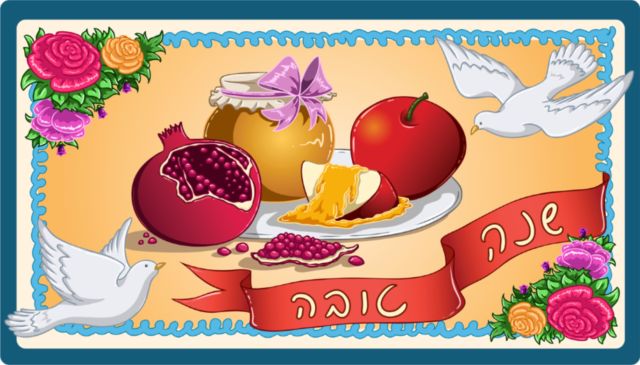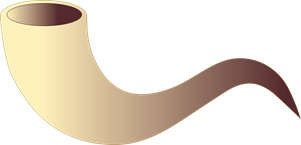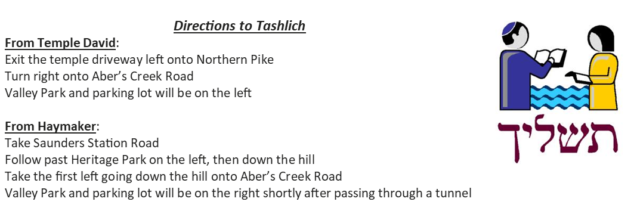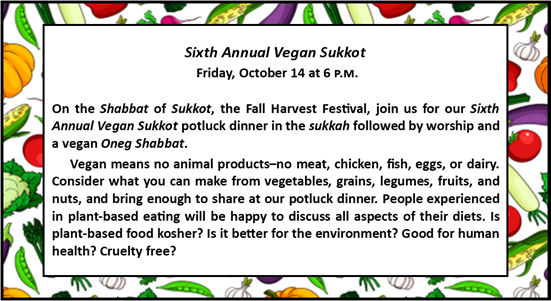

High Holy Day Information
Please click here if you need another copy of the first High Holy Day mailing containing information on service dates/times, tickets, parking, children’s services, and much more.
Also, please click here for a single-page copy of the service dates/times.
A Private Moment on the Bimah
Leading up to the new year, would standing on our bimah before the ark be meaningful to you?
If so, Rabbi Symons is setting up 15-minute intervals during which we will maintain physical distancing while inviting spiritual connection.
Please contact Rabbi Symons at rabbi@templedavid.org or 412-372-1200 to schedule a time.

Shalom! Well, it is that time of year when your mailbox will be bombarded with TD mailings. Please look everything over carefully and if you have questions, please reach out to the contact person listed.
Here are a few items to remember:
- Watch the deadlines. I get quite busy a week or so before the holidays, which means there may not be enough time to get things mailed to you.
- Tickets will be mailed to you at least two weeks prior to Rosh HaShanah.
- The 2022-23 Yizkor book will be mailed to each family prior to Yom Kippur.
- If you need a HHD Prayer book, they will once again be in the front lobby along with a sign out sheet.
- PLEASE: always read your bulletin and watch for your weekly e-mail for changes and updates to the calendar and events.
Please remember to stay safe, healthy and be kind!
Beverly,
tdoffice@templedavid.org
Elul Study: A Storied Approach to the High Holy Days
Thursdays at 7 p.m. (Sept. 1, 8, 15, and 22)
Online only at www.templedavid.org/athome
Each week we will use a short story or text to discuss in preparation for the High Holy Days.
Sept. 1: Rabbi Simchah Bunim of Peshischa used to tell his followers:
There was a poor Jew named Yankel from Galicia who dreamed that there was gold under a bridge in Prague, hundreds of miles away. After much thought and anguish, he decided to saddle his horse and head off alone from his house in search of that gold, which would sustain him for the rest of his life. Yankel got to Prague and found that the bridge about which he dreamed several times was heavily guarded. With no idea what else to do, he simply went underneath the bridge with a shovel and began to dig. Before he broke ground, however, he felt a tap on the shoulder. Yankel turned around and saw a soldier glaring intimidatingly at him. “What are you doing?” said the soldier. Knowing that any evasion was useless, Yankel said, “I dreamed that there was a chest of gold buried here, and I am hoping that it could sustain me and the rest of my family for the remainder of my life.” The soldier stared at Yankel with disbelief. “You will not find any treasure here, but I dreamed that there was a large pot of gold under the stove of a poor Jew called Yankel!” Yankel looked at the soldier and said, “I am Yankel!” He rushed back to his house, removed the stove, and began digging. Lo and behold, after a half hour, he found a large chest filled with gold, which helped sustain his family for the rest of his life.
(As told in The Book of Proverbs: A Social Justice Commentary by Rabbi Dr. Shmuly Yanklowitz)
Sept. 8: Rabbi Samson Raphael Hirsch, the leader of 19th century Germany Orthodoxy, surprised his students one day when, as he neared the end of his life, he insisted on traveling to Switzerland. Perplexed, his students asked him why such a journey was so important to him. In response, he explained, When I stand shortly before the God, I will be held answerable to many questions. But what will I say when God asks–and God is certain to ask–“Shimshon, did you see my Alps?”
Sept. 15: The Sassover Rebbe entered a hotel and sat beside two local peasants. As the two peasants sat at the bar and drank, they began to fall into a drunken stupor. One turned to his friend and said, “Tell me, friend, do you love me?” His colleague responded, “Of course I love you. We’re drinking companions. Naturally I love you.” Then the first one said to his friend, “Then tell me, friend, what causes me pain?” His colleague said, “How should I know what hurts you? I’m just your drinking buddy.” He said, “If you loved me, you would know what causes me pain.” (Same source as above.)
Sept. 22: A prince goes insane and believes that he is a rooster. He takes off his clothes, sits naked under the table, and pecks at his food on the floor. The king and queen are horrified that the heir to the throne is acting this way. They call in various sages and healers to try and convince the prince to act human again, but all in vain. Then a new wise man comes to the palace and claims he can cure the prince. He takes off his clothes and sits naked under the table with him, claiming to be a rooster, too. Gradually the prince comes to accept him as a friend. The sage then tells the prince that a rooster can wear clothes, eat at the table, etc. The rooster Prince accepts this idea and, step-by-step, begins to act normally, until he is completely cured.

Selichot: Entering the High Holy Days Together
Saturday, September 17
8 p.m. A Taste of the Jewish World
9 p.m. Selichot Service (also on Zoom)
 We enter the High Holy Days through this meaningful program and service that introduces the liturgical and musical themes of the High Holy Days. Don’t miss “A Taste of the Jewish World,” where you can sample Jewish foods from around the world!
We enter the High Holy Days through this meaningful program and service that introduces the liturgical and musical themes of the High Holy Days. Don’t miss “A Taste of the Jewish World,” where you can sample Jewish foods from around the world!

Prior to Rosh HaShanah, Rabbi Daniel Fellman and/or Cantor David Reinwald of Temple Sinai, and Rabbi Barbara Symons of Temple David will conduct the annual Service of Remembrance.
It is a special time to honor and remember our loved ones who are no longer with us. All are welcome. Chairs and a tent will be provided.
Temple David Members may purchase cemetery plots at Temple Sinai Memorial Park at Temple Sinai Member Prices. Please contact Temple Sinai for details and pricing (412 421-9715).
Tashlich Ritual at Valley Park (Aber’s Creek Road) in Monroeville
ONLINE AND IN-PERSON—Monday, September 26 at 4 p.m.
Please come together at Turtle Creek in Valley Park to join in the powerfully simple ritual of tashlich, meaning―casting. During tashlich, we cast off our sins by symbolically placing them on bread and throwing them into a stream of flowing water.
Having closed the machzor, and standing in the midst of nature, it is another opportunity to do some soul searching in the midst of our community.
Even if you have never joined us before, please join us this year, in-person or on Zoom.
Please bring individually-wrapped desserts or drinks to share.
The link will be available at www.templedavid.org/athome


RSVPs preferred by Noon on Wednesday, September 28
412-372-1200 or tdoffice@templedavid.org

Questions? Recipe ideas?
Contact Stan Beck at stanb@templedavid.org or (412) 491-0313.

